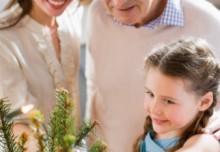 Perhaps you have now had the chance to once again be together with family and older loved ones for the holidays or maybe the visit is still on your calendar? If so, you may have noticed or soon will notice that some things are not quite the same, and the changes may be subtle. You may notice that your older loved one’s reaction time behind the wheel is more than a bit slow or tentative. You may see evidence that your loved one is more than just “behind on housekeeping;” there may be signs that taking care of home is just more than they are up to. Or you may notice that they have some difficulty standing after sitting for a time or that there is a shuffle to their walk. What can you do?
Perhaps you have now had the chance to once again be together with family and older loved ones for the holidays or maybe the visit is still on your calendar? If so, you may have noticed or soon will notice that some things are not quite the same, and the changes may be subtle. You may notice that your older loved one’s reaction time behind the wheel is more than a bit slow or tentative. You may see evidence that your loved one is more than just “behind on housekeeping;” there may be signs that taking care of home is just more than they are up to. Or you may notice that they have some difficulty standing after sitting for a time or that there is a shuffle to their walk. What can you do?
Driving. Talking about giving up the car keys may be premature, but the per mile rates of auto accidents escalates rapidly after about age 70. So, you have to ask yourself if you would prefer to have this hard talk before or after a collision. Then, you need to ask how you would want to be approached if you were the questionable driver. Ask them about how safe they feel on the road with “drivers these days.” And do not hesitate to reach out to your loved one’s primary care provider as someone who may be able to speak with more authority.
Housekeeping 101. This one is more than keeping tidy in the kitchen. If you have done a surreptitious check on the quality and quantity of food your older loved one has in the pantry or refrigerator, you may have found limited quantities as well as staples beyond their expiration dates or making their way to a science experiment. This may be as simple as getting a shopper for your mom or dad, and you can offer to help them find someone to help with the “heavy lifting.” Another “heavy” may be in the housecleaning category. No one really relishes pulling out the refrigerator to vacuum or to get under the bed to chase out the dust bunnies. Getting your loved one to agree to help with the heavy lifting on this front may be a nice step toward getting more help as needs change.
Fall Risks. Housekeeping may help in beginning to eliminate some of the fall risks your older loved one may face at home. Every year about one in three adults over age 65 have a fall, fortunately not all of them serious. But look for worn carpeting whose frayed edges are a trip risk, particularly on stairs. Scatter rugs also are a big risk as are cords for electrical devices that may be blocking walkways. These may be easy suggestions to make, but you may also wish to bring in a professional like a geriatric care manager who can walk through a veritable checklist on what to look for along with many of the easy fixes.
With all of these facets of “home improvement,” it is important to remember that you do not have to go it alone in the conversations with mom or dad. You may enlist the support of your siblings so that the whole family is trying to lend a hand, particularly if you collectively have a history of working together around the house. Barring that, you also can raise these subjects in a less threatening way, such as in the kitchen while helping with serving or preparing the next family meal…just one on one. Or if it is the older father, a walk around the yard or block may be an easier venue for a conversation. People tend to talk easier if the talking accompanies a task. There is always that family friend of your older loved one who has been like the extra aunt or uncle who can help facilitate a conversation. And here again, talk with a geriatric care manager about your concerns and how best to bring them up to an older loved one. It does take a village. Charlotte Bishop is a Geriatric Care Manager and founder of Creative Care Management, certified professionals who are geriatric advocates, resources, counselors and friends to older adults and their families in metropolitan Chicago. Please email your questions to info@creativecaremanagement.com.






